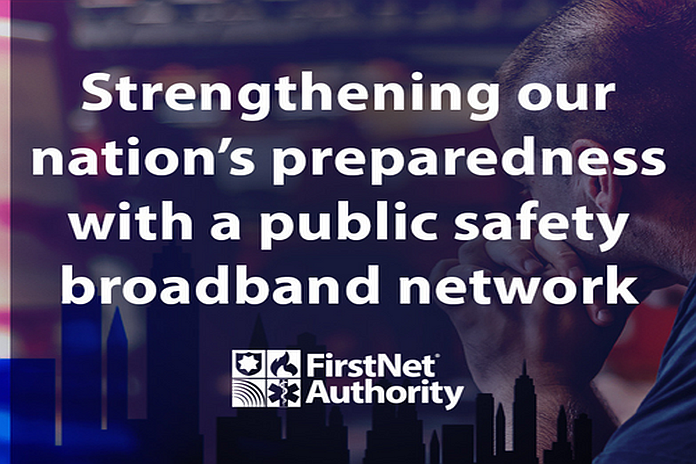By Stephen Benjamin, Chair of the First Responder Network Authority (FirstNet Authority)
September marks the 21st anniversary of the 9/11 attacks. It is also National Preparedness Month, which raises awareness about the need to be ready for any and all emergencies. Both serve as poignant reminders that disasters and emergencies can happen at any time, without precedent, and that we must do our best to prepare for them.
Like all Americans, I vividly remember where I was on September 11th – watching the horror unfold on a small black-and-white TV in my office while knowing that my father, a contractor, was working in downtown Manhattan that morning. I was desperately praying for his safety.
I was grateful for our nation’s first responders that day. They displayed incredible heroism, especially when you consider the communications challenges they faced. Radios didn’t operate effectively across agencies. Commercial phone lines and wireless services were overwhelmed by the volume of calls and interruptions to the communications infrastructure. Responders struggled with basic communications at a time when they needed them the most.
The events of that tragic day went a long way toward reshaping the trajectory of public safety in this country, including the communications systems used by our nation’s first responders.
In the aftermath of the attacks, the public safety community came together to advocate for improvements to the nation’s emergency communications. They called for a single public safety network that would be interoperable and reliable under extreme circumstances – a network that would always prioritize their communications during emergencies and keep them connected in every state and territory, including in rural areas.
Their vision moved closer to reality in 2012 when legislation created the First Responder Network Authority (FirstNet Authority) within the U.S. Department of Commerce.
Transforming public safety communications
At the FirstNet Authority, our mission is to ensure the build-out and enhancement of FirstNet, an interoperable wireless broadband network that serves first responders in every state and territory. We do so through a public-private partnership between the FirstNet Authority and our network contractor, AT&T.
This arrangement enables us to continually evolve the network, deliver innovation to public safety, and direct improvements based on our analysis of what public safety needs most from the network. AT&T has also stepped up to answer the call from public safety, building out the network at an accelerated pace and delivering mission-ready solutions to FirstNet subscribers.
The network is connecting them during emergencies and everyday operations. FirstNet has supported responders’ management of the pandemic response in big cities and small towns, from the early days of testing clinics to the rollout of mass vaccination sites. The network continues to be crucial during disasters, helping first responders battle wildfires in the heartland of our country and supporting recovery efforts after floods. FirstNet also keeps people safe at large events by providing the coverage and priority access that first responders need to communicate in crowds.
In the aftermath of 9/11, I could not have imagined a day when public safety would have access to their own high-speed network – much less one that connects first responders in every state and territory and currently serves more than 21,000 agencies. Now, with FirstNet, public safety has the dedicated, interoperable communications network they fought for following September 11th.
Engaging with public safety
While the network has made significant progress in a short time, our job is not done. At the FirstNet Authority, we know there is more to do to achieve public safety’s vision for the network. That is why our top priority is to ensure the network evolves with advances in technology and is flexible enough to address the ever-changing needs of public safety.
Here at the FirstNet Authority, we take a “public safety first” approach to the network. Our team of experts and advisors connects with first responders every day, hearing their feedback, learning how they use the network on a day-to-day basis, and finding out what is working for them or what challenges they might be facing.
The FirstNet Authority also works closely with our Public Safety Advisory Committee (PSAC) to review public safety’s most pressing communications needs. With representatives from all disciplines of public safety – as well as state, territorial, tribal, and local governments – the PSAC truly represents the voices of responders nationwide.
Using public safety’s input, we determine how to best evolve and invest in the network to meet responders’ operational needs. Following this approach, the FirstNet Authority has made strategic investments to upgrade the network for 5G and boost coverage on the network to serve public safety wherever its mission takes them.
Moreover, our program is having a broader impact beyond the network itself. There is now a more competitive, innovative marketplace serving first responders first. Once an afterthought in new technology rollouts, the public safety community is now a growing market for the telecom and IT sector to consider when developing devices, applications, and software.
Preparing for emergencies
As the nation reflects on the anniversary of September 11th, we salute the women and men of public safety and remember the thousands of lives lost from this tragedy, including the hundreds of brave first responders that rushed to the scenes of the attacks.
While we may not know what emergencies could befall us in the future, we do know that emergencies begin and end at the local level. It is critically important that individuals make plans to prepare for disasters of all types and that collectively, we continue to build more resiliency and redundancy into all of our communities – urban, suburban, and rural.
The FirstNet Authority will continue to do its part to strengthen the nation’s emergency preparedness by making sure the best possible communications network is serving the men and women who protect us every day.





